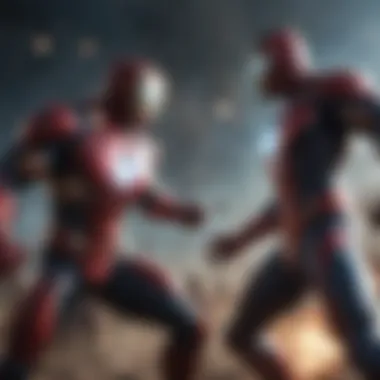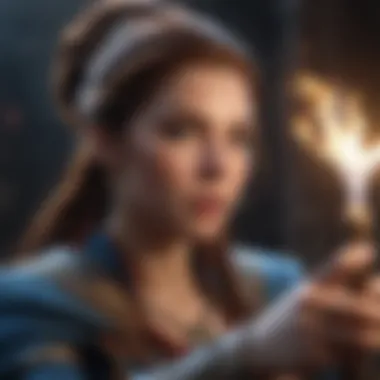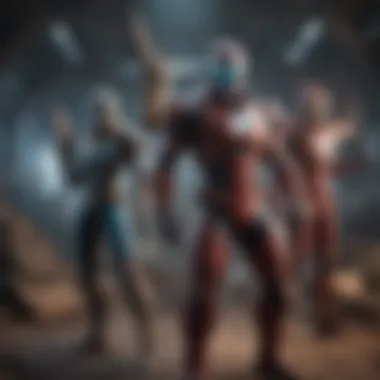Exploring the Marvel Comics Universe: A Detailed Journey Through Marvel's Icons


Industry Insights
Marvel Comics is not just a collection of graphic novels and superheroes; it is a cultural phenomenon that extends its reach beyond the confines of traditional media. In recent years, the comic industry has witnessed a surge in popularity, with an increasing number of readers delving into the captivating world of graphic storytelling. This trend reflects a growing appreciation for the intricate narratives and complex characters that populate the Marvel Universe, showcasing how the realm of comics continues to evolve and captivate audiences across the globe.
- Latest Trends in Comic Industry
As the landscape of the comic industry shifts and transforms, new trends and innovations emerge to redefine storytelling in this digital age. From immersive graphic novels that blur the lines between reality and fiction to interactive storytelling experiences that engage readers on multiple levels, the latest trends in the comic industry reflect a desire for dynamic and immersive narratives that resonate with contemporary audiences.
- Behind-the-Scenes of Popular MoviesTV Shows
The impact of Marvel Comics transcends the pages of comics and extends into popular media such as movies and TV shows. Behind every successful on-screen adaptation lies a rich tapestry of creativity, collaboration, and strategic decision-making. By exploring the behind-the-scenes processes that bring beloved characters to life on the big and small screens, fans gain a deeper appreciation for the meticulous craftsmanship and artistic vision that drive the Marvel Cinematic Universe and beyond.
- Impact of Gaming Technology on Pop Culture
Gaming technology has revolutionized the entertainment industry, reshaping how audiences interact with their favorite franchises and characters. From immersive virtual reality experiences that transport players into the heart of the Marvel Universe to innovative gameplay mechanics that redefine player agency and storytelling, the impact of gaming technology on pop culture is undeniable. As gaming continues to blur the lines between different forms of media, the Marvel Universe remains at the forefront of this digital revolution.
- Emerging Trends in Anime Industry
The anime industry continues to inspire and captivate audiences with its visually stunning animation, compelling storytelling, and diverse range of genres. As anime gains mainstream popularity and global recognition, emerging trends within the anime industry point towards continued innovation, creativity, and cross-cultural collaboration. From groundbreaking studio productions to independent creators pushing the boundaries of traditional animation, the anime industry is a vibrant and ever-evolving landscape that resonates with fans of all ages.
Introduction
As we navigate through the annals of Marvel's history, probing into the depths of its evolution and the creative minds that sculpted its very essence, we begin to understand the enduring significance of this expansive universe. Delving beyond mere storytelling, we unearth a cultural phenomenon that has ingrained itself in the hearts and minds of millions globally. The Introduction acts as a prologue, inviting readers to immerse themselves in a world woven with tales of valor, intellect, and the eternal struggle between good and evil.
At its core, this section acts as a compass, guiding enthusiasts and newcomers alike through the labyrinth of Marvel Comics, providing a roadmap to appreciate the nuanced layers that embody this revered franchise. Shedding light on the foundations of Marvel, we set the stage for a meticulous dissection of its evolution, characters, storylines, and broader impact on popular culture. The Introduction not only sets the tone for what lies ahead but also instills a sense of anticipation, a thirst for knowledge that propels readers deeper into the multifaceted universe of Marvel Comics.
Historical Evolution of Marvel Comics
The Historical Evolution of Marvel Comics holds a paramount significance in this in-depth exploration of the Marvel Universe. Understanding the roots and development of Marvel Comics not only provides insight into the evolution of storytelling but also sheds light on the cultural impact and relevance of these fictional worlds. By tracing the historical trajectory of Marvel Comics, readers can appreciate the intricate connections between past narratives and present storylines, offering a comprehensive perspective on how the comic book industry has transformed over time.
The Golden Age of Comics


During The Golden Age of Comics, which spanned from the late 1930s to the early 1950s, the foundation of what would become Marvel Comics was laid. This era marked the debut of iconic characters like Captain America, Human Torch, and Namor the Sub-Mariner, establishing the superhero genre as a dominant force in popular culture. The Golden Age set the stage for creativity and innovation in comic book storytelling, introducing readers to a world where extraordinary individuals fought against evil forces, capturing the imagination of audiences during a tumultuous period in global history.
The Silver Age Revolution
The Silver Age Revolution, a period that commenced in the late 1950s and extended through the 1960s, revolutionized the comic book industry with a new wave of characters and narratives. Marvel Comics, under the guidance of visionaries like Stan Lee and Jack Kirby, redefined superhero conventions by infusing flawed personalities and contemporary issues into their storytelling. This era witnessed the creation of iconic figures such as Spider-Man, the Fantastic Four, and the X-Men, igniting a renaissance in comic book popularity and setting the stage for a new era of innovation and creativity in the medium.
Modern Era and Beyond
The Modern Era of Marvel Comics, which began in the 1980s and continues into the present day, showcases a diverse range of stories, characters, and themes that reflect the ever-changing landscape of popular culture. With advancements in technology and storytelling techniques, Marvel Comics has continued to adapt to new audiences while staying true to its core values of heroism, diversity, and social commentary. The contemporary era of Marvel Comics explores complex narratives, introduces groundbreaking characters, and embraces a global audience, solidifying its position as a powerhouse in the comic book industry and a cultural touchstone for generations to come.
Iconic Characters in Marvel Comics
In the vast realm of Marvel Comics, iconic characters play a pivotal role, shaping the very essence of this comic book universe. These characters are not mere creations; they are cultural icons representing various virtues, flaws, and complexities. From the friendly neighborhood Spider-Man to the mighty Thor, each character holds a unique place in the hearts of fans and enthusiasts. The significance of iconic characters in Marvel Comics cannot be overstated. They serve as pillars upon which vast storylines and universes are built, resonating with audiences on a profound level.
Spider-Man
Spider-Man, also known as Peter Parker, epitomizes the idea of a relatable superhero. His struggles with everyday life, love, and the burden of responsibility have endeared him to fans worldwide. Spider-Man's character development, from a high school student grappling with newfound powers to a seasoned hero facing formidable foes, showcases a narrative depth seldom seen in comic book characters. The themes of power, sacrifice, and morality woven into Spider-Man's story make him a compelling and enduring figure in the Marvel Universe.
Iron Man
Tony Stark, the man behind the Iron Man suit, represents the epitome of human ingenuity and flawed heroism. His journey from a self-absorbed billionaire to a selfless protector is a testament to the transformative power of redemption. Iron Man's technological prowess, wit, and internal conflicts make him a dynamic character that challenges traditional superhero archetypes. His impact on both the Marvel Universe and pop culture at large is undeniable, cementing his status as one of the most iconic figures in comic book history.
Captain America
Captain America, aka Steve Rogers, embodies the ideals of heroism, patriotism, and unwavering integrity. As a symbol of hope and resilience, Captain America stands as a beacon of moral certainty in a world filled with chaos and uncertainty. His unwavering dedication to justice and fairness resonates with audiences of all ages, making him a timeless symbol of courage and honor. Through his actions and values, Captain America inspires readers to stand up for what is right, no matter the cost.
Thor
The God of Thunder, Thor, represents a different facet of heroism rooted in mythology and cosmic adventure. As an Asgardian prince wielding Mjolnir, Thor exudes power, honor, and duty in equal measure. His dynamic character arc, from a brash warrior to a wise king, mirrors the timeless themes of growth, redemption, and sacrifice. Thor's mythology-rich backstory and larger-than-life presence bring a mythical dimension to the Marvel Universe, adding depth and grandeur to the tapestry of heroes and villains.
Key Storylines and Events
In the realm of Marvel Comics, understanding the key storylines and events is paramount to immersing oneself in the vast narrative tapestry that this universe offers. These pivotal moments shape the trajectories of beloved characters, spark monumental conflicts, and redefine the very essence of heroism. Each storyline serves as a testament to the creativity and ingenuity of the writers and artists behind Marvel Comics. Through intricate plotlines and character developments, these events not only captivate readers but also leave a lasting impact on the overarching Marvel Universe.


Civil War
One of the most monumental events in Marvel Comics history, Civil War, delves into the ethical dilemmas and personal conflicts that arise when superheroes are divided over the Superhuman Registration Act. This gripping storyline pits hero against hero, exploring themes of accountability, freedom, and loyalty. Characters are forced to take sides, blurring the lines between right and wrong, culminating in an explosive showdown that forever changes the dynamics of the Marvel Universe. Civil War challenges readers to question the very nature of heroism and presents a narrative that is as thought-provoking as it is action-packed.
Infinity Gauntlet
The Infinity Gauntlet saga catapults readers into a cosmic odyssey of unimaginable power and cosmic entities. Centered around the omnipotent Thanos and the all-powerful Infinity Stones, this storyline explores the consequences of wielding ultimate power. As Thanos seeks to impress Death herself by eradicating half the universe, the Avengers and cosmic heroes unite to thwart his apocalyptic plans. Infinity Gauntlet showcases epic battles, emotional struggles, and philosophical undertones, painting a vivid portrait of cosmic forces at play and the resilience of humanity in the face of omnipotence.
Secret Wars
Secret Wars stands as a grand orchestration of alternate realities, interdimensional conflicts, and unexpected alliances. When various Marvel universes collide on the patchwork planet Battleworld, heroes and villains must set aside their differences to survive. Driven by the enigmatic Beyonder's machinations, this storyline challenges characters to confront their inner demons, forge unlikely alliances, and navigate a world where reality itself is malleable. Secret Wars weaves a tapestry of intrigue, betrayal, and redemption, reshaping the Marvel landscape and pushing characters to their limits in a battle for survival and supremacy.
Creative Minds Behind Marvel Comics
As we delve into the depths of the Marvel Universe, it is imperative to acknowledge the creative minds that have sculpted this vast and intricate world. The topic of Creative Minds Behind Marvel Comics encapsulates the genius minds responsible for birthing iconic characters and captivating storylines that have stood the test of time within the comic book industry. Understanding the visionaries behind the scenes provides a fascinating insight into the origins of beloved superheroes and supervillains, shedding light on the meticulous craftsmanship and narrative prowess inherent in Marvel's creations.
Stan Lee
Stan Lee, often hailed as the face of Marvel Comics, contributed significantly to shaping the comic book landscape as we know it today. With a career spanning decades, Lee co-created legendary characters like Spider-Man, the X-Men, and the Fantastic Four, revolutionizing the superhero genre with flawed, relatable protagonists. His innovative approach to storytelling and knack for engaging readers elevated Marvel Comics to unprecedented heights, making him a legendary figure in the realm of pop culture.
Jack Kirby
Jack Kirby, the prolific artist and co-creator behind numerous Marvel superheroes, played a pivotal role in defining the visual identity of the Marvel Universe. Kirby's dynamic art style and boundless imagination gave life to characters such as Thor, Hulk, and Black Panther, shaping the iconic look and feel of Marvel Comics. His artistic vision and creative collaboration with Stan Lee laid the foundation for many enduring Marvel narratives, cementing his legacy as a titan of the comic book industry.
Steve Ditko
Steve Ditko, the enigmatic artist and co-creator of Spider-Man and Doctor Strange, brought a unique and introspective dimension to the Marvel Universe. Known for his intricate artwork and philosophical narrative themes, Ditko introduced readers to complex characters grappling with morality and existence. His profound influence on Marvel's character development and visual storytelling added depth and intellectual intrigue to the comic book landscape, establishing him as a visionary in the realm of sequential art.
Expansion into Other Media
Marvel Comics' expansion into other media marks a significant milestone in the franchise's evolution. This article delves deep into how Marvel strategically leveraged various forms of media to reach a broader audience and create a more immersive fan experience. The exploration of other media outlets such as movies, TV shows, and video games allowed Marvel to not only extend its storytelling beyond comic books but also solidify its position in popular culture. Through these mediums, Marvel was able to bring beloved characters to life in ways that resonated with fans across different platforms, further cementing its status as a cultural phenomenon.


Marvel Cinematic Universe
Marvel Cinematic Universe (MCU) stands out as one of the most ambitious and successful film franchises in cinematic history. Spanning across multiple phases and interconnected storylines, the MCU redefined the superhero genre and set a new standard for shared universe storytelling. This subsection delves into the intricacies of the MCU, exploring how Marvel Studios meticulously crafted a cohesive narrative charting the adventures of iconic heroes like Iron Man, Captain America, and Thor. The impact of the MCU extends beyond the box office, shaping modern pop culture and inspiring a new wave of comic book adaptations in the film industry.
Television Adaptations
Marvel's foray into television adaptations brought a new dimension to the storytelling capabilities of the franchise. From series like 'Agents of S.H.I.E.L.D' to 'Daredevil' and 'Jessica Jones,' Marvel expanded its universe onto the small screen, intertwining complex narratives with character-driven dramas. This section delves into the diverse range of television projects Marvel embarked on, dissecting how these adaptations contributed to the overall world-building and character development within the Marvel Universe.
Video Games and Merchandise
The realm of video games and merchandise offered Marvel a unique opportunity to engage with fans on a more interactive and tangible level. Marvel's presence in the gaming industry resulted in the creation of immersive gaming experiences that allowed players to step into the shoes of their favorite superheroes. Moreover, the merchandising of Marvel characters and memorabilia further solidified the brand's presence in popular culture, serving as collectibles for avid fans and a means to deepen the connection between audiences and the Marvel Universe.
Legacy and Impact of Marvel Comics
Marvel Comics has left an indelible mark on the world of entertainment, emerging as a cultural behemoth that transcends mere comic book storytelling. The legacy and impact of Marvel Comics extend far beyond the pages of its publications, resonating with audiences across various mediums and generations. As we dissect the core of this topic, it becomes evident that Marvel's influence is a double-edged sword, showcasing both the positive and negative ramifications of its cultural dominance.
Cultural Influence and Representation
One of the most notable aspects of Marvel's legacy is its unparalleled ability to reflect the cultural zeitgeist of different eras. Through diverse characters like Black Panther, Ms. Marvel, and more, Marvel has championed representation and inclusivity in ways that were unprecedented in the comic book industry. This commitment to diversity has not only enriched storytelling but has also empowered marginalized communities, resonating with a global audience hungry for authentic and inclusive narratives.
Shaping Generations and Inspiring Creativity
Marvel Comics has served as a creative wellspring that has inspired new generations of artists, writers, filmmakers, and storytellers. The iconic characters and timeless narratives created by Marvel have become touchstones of popular culture, influencing everything from blockbuster films to avant-garde literature. By blending high-stakes action with poignant emotional arcs, Marvel Comics has set a standard for storytelling that continues to spark imagination and creativity in audiences worldwide.
Economic Impact and Industry Evolution
Beyond its cultural impact, Marvel Comics has played a pivotal role in shaping the entertainment industry's economic landscape. The success of Marvel's cinematic universe, along with its extensive merchandise and licensing agreements, has turned the company into a multi-billion-dollar empire. This financial success has not only elevated Marvel Comics to a position of industry dominance but has also reshaped how intellectual properties are developed, marketed, and consumed in the modern age.
Critical Analysis and Societal Discourse
As Marvel Comics continues to propagate its universe across new mediums, from television to video games, it has sparked critical discussions on the nature of heroism, morality, and power dynamics in society. Themes explored in Marvel's narratives, such as accountability, redemption, and the nature of good and evil, have provided a mirror through which audiences can reflect on their own lives and societal structures. This complex interplay between fiction and reality underscores the enduring relevance and impact of Marvel Comics in shaping contemporary discourse.
Conclusion
The 'Conclusion' section of this comprehensive guide to Marvel Comics serves as a crucial wrap-up, synthesizing the vast expanse of information covered in the preceding sections. This final segment plays a pivotal role in providing readers with a holistic understanding of the Marvel Universe and its significance in pop culture. It encapsulates the essence of Marvel's evolution, from its humble beginnings to its current status as a cultural juggernaut, influencing not only comics but also movies, TV shows, anime, and gaming. The 'Conclusion' reinforces the idea that Marvel Comics are not just stories on paper but a reflection of societal values, innovations, and aspirations over the decades.
Moreover, in this closure, readers gain a sense of closure to the intricate narratives and characters explored throughout the article. It ties together the historical evolution, iconic characters, key storylines, creative minds, expansive media presence, and legacy of Marvel Comics into a unified tapestry of creativity and impact. The 'Conclusion' acts as a meta-narrative, inviting readers to ponder the lasting influence of Marvel on global pop culture and its ability to continuously reinvent itself to resonate with diverse audiences.
By delving into this concluding section, readers can reflect on the shared experiences, emotions, and inspirations that Marvel Comics have brought to fans worldwide. It emphasizes that beyond entertainment, comics can be agents of change, empowerment, and representation. The 'Conclusion' emphasizes that the Marvel Universe is a dynamic, ever-expanding realm that invites everyone, regardless of background, to find themselves in its heroes, villains, and narratives. In essence, the 'Conclusion' cements Marvel Comics as more than just a publisher but a cultural force that transcends generations and genres, leaving an indelible mark on the tapestry of storytelling in the modern world.



